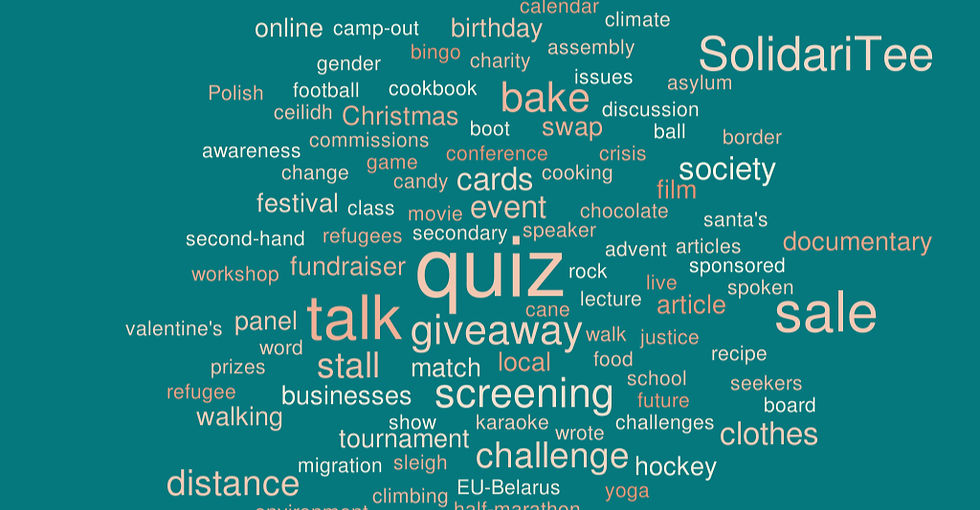Fenix Humanitarian Legal Aid: taking a holistic, multidisciplinary approach to upholding rights
- Alexa Netty
- Nov 5, 2021
- 4 min read
Updated: Nov 10, 2021
CN: su*cide, r*pe, PTSD, detailed descriptions of trauma responses
To be a refugee is, by definition, to have endured trauma. Not only as a result of the original persecution and violence from which someone was forced to flee, but often also as a result of life-threatening journeys which frequently involve reported violent ‘push-backs’, treacherous physical conditions, and, all too-often, sexual exploitation and abuse.
The very process of ‘refugee status determination’, which hinges on a person’s asylum interview, is based around recounting such trauma in minute detail. Asylum interview questions are specific; deliberately so, and often asked with an undertone of disbelief – in other words, asylum seekers are forced to recount their worst traumas in a profoundly unsafe situation, and to tell these stories in a way that will be deemed ‘credible’. And this doesn’t even begin to address the fact that many asylum seekers are living in dire conditions, often sleeping rough or in open air tents, at constant risk of exploitation and violence, with constant anxiety surrounding whether or not they will be sent back to a country where their life is at risk.
In most contexts, a ‘trauma-informed’ approach, when working with a therapist, would mean never forcing someone to recount their experiences unless they choose to, and certainly never when that person was still in a physically unsafe situation. Acute trauma can also lead to severe dissociation, the brain’s coping mechanism during and following inescapable harm, which can cause memory issues, and in some cases complete non-recollection, especially when PTSD has developed. No such approach is possible within an asylum interview, an explicitly re-traumatising process.
That’s where legal aid NGOs such as Fenix come in. Not only are their expert legal teams on hand to guide people through the asylum process, but they are one of the very few NGOs which also have a designated mental health and psychological support team, as well as a protection team.
Fenix’s qualified psychologists offer group sessions to women from the refugee community in Lesvos, sharing coping skills and anxiety management techniques, and providing a safe space to connect with other women who have shared similar experiences. They also work with unaccompanied minors and translators, who are often themselves from the refugee community, doing a job with the potential to be highly re-traumatising by interpreting other peoples’ stories in interview preparation sessions, and provide emergency stabilisation sessions for those experiencing acute su*cidality.
This only begins to scratch the surface of the work that Fenix does. Their protection team supports people in navigating the surrounding procedures which are so crucial to survival in camps, and which enable people to access their most basic rights. For example, assisting wheelchair users in getting to their hospital appointments, making referrals for medical or psychological support, and taking those who have experienced s*xual assault to STD screenings. Asylum seekers are some of the most resilient people on earth, but within a system which seeks to set people up to be disempowered, making even the most basic administrative tasks excessively complicated and inaccessible, booking and travelling to such appointments often becomes logistically impossible without an advocate.
The asylum system is inherently imperfect, and legal aid is often a matter of doing the best one can with the tools available. The bureaucracy can be stifling, and weeks and months are often spent trying to change procedures which make up just one minute element of the process. But this has never stopped Fenix from working to campaign for due process to be upheld. One example of this is their success in demonstrating that unaccompanied minors had been wrongly identified as adults, or worse not been identified at all after the fires in Moria. Another relates to their advocacy efforts in enabling victims of t*orture to be recognised as such, when authorities are so reticent to refer to this type of persecution as anything other than ‘violence – physical, mental’. T*rture is a legal term, and as such, more generalised violence classifications do not bring with them the same protections, or weight of evidence within an asylum process, as an accurate identification. Fenix continue to demand the recognition and upholding of asylum seekers’ rights, according to Greek and international law and principles, and their persistence and drive to provide holistic, impactful support could not be clearer.
Legal aid does not exist in a vacuum; for refugees and asylum seekers, the world keeps turning, throughout the months and often years of legal limbo, with evolving needs and wishes throughout. But legal aid is the clothes peg upon which all other rights and liberties precariously hang, and furthering its provision is the best way of upholding these we know.

Above: Fenix team conducting client sessions
Alexa Netty is trustee and chair of the steering committee, and was SolidariTee's Executive Director from 2020-21. She wrote this account following a recent visit to Fenix in Lesvos, Greece. Alexa holds a degree in veterinary medicine, and in psychology, neuroscience and behaviour from Cambridge, which focused specifically on PTSD.






Raja Game is an exciting mobile game with great visuals and engaging missions. I really enjoy how it combines strategy and fun, keeping players hooked for hours. The smooth performance and creative gameplay make it stand out from other games. Definitely a must-try for anyone who loves adventure and entertainment.